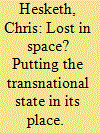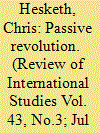| Srl | Item |
| 1 |
ID:
161132


|
|
|
|
|
| Summary/Abstract |
This article explores the notion of a transnational state (TNS) as advanced by scholars working within Historical Materialism. In recent decades, Historical Materialist approaches to the Social Sciences have enjoyed a major intellectual renaissance. Fittingly, the reasons for this renaissance can be found in some major developments within contemporary capitalism. The first of these developments can be located in a renewed interest in the topic of imperialism as an interpretive category of geopolitics. The second development concerns the viability of the capitalist system itself following the global financial crisis of 2007/8. One major attempt to comprehend these issues has come through the postulation of an emergent TNS apparatus as part of a new global capital relation. This article explores this thesis but argues that it fails to adequately account for continued plurality, contingency and struggle at the nation-state scale which in turn provides the basis for potential conflict.
|
|
|
|
|
|
|
|
|
|
|
|
|
|
|
|
| 2 |
ID:
153253


|
|
|
|
|
| Summary/Abstract |
In this article, I argue that Antonio Gramsci’s concept of passive revolution makes a foundational contribution to International Relations (IR), yet has been relatively under appreciated by the broader discipline. Within the Historical Sociology of International Relations, uneven and combined development has recently been postulated as a key trans-historical law that provides a social theory of the ‘international’. Drawing from, but moving beyond these debates, I will argue that passive revolution is a key conditioning factor of capitalist modernity. I will demonstrate how the concept of passive revolution is the element that explains the connection between the universal process of uneven development and the manner in which specific combinations occur within the capitalist era as geopolitical pressures, in tandem with domestic social forces become internalised into geographically specific state forms. It therefore offers a corrective to the frequently aspatial view that is found in much of the literature in IR regarding uneven and combined development. Additionally, passive revolution provides a more politicised understanding of the present as well as an important theoretical lesson in relation to what needs to be done to affect alternative trajectories of development.
|
|
|
|
|
|
|
|
|
|
|
|
|
|
|
|